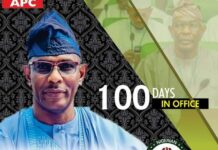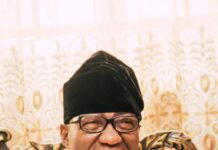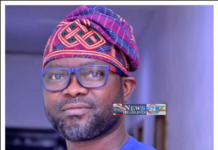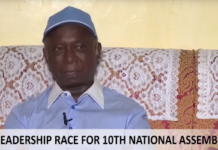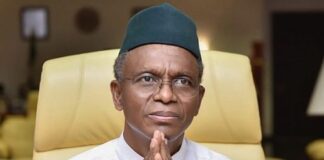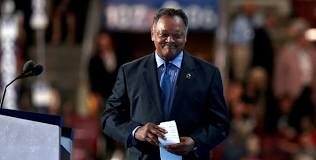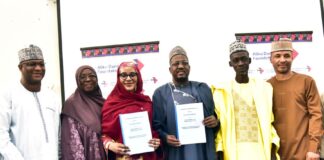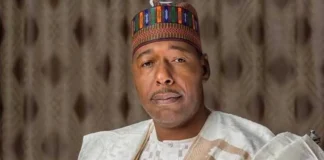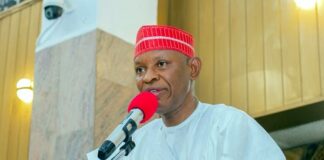Kwara State governor, Abdulfatah Ahmed, was one of the five governors that walked, with other chieftains of the Peoples Democratic Party (PDP), out of the party in the buildup to the 2015 general elections to strengthen the All Progressives Congress (APC) that eventually chased their former platform out of power.
He did not rule out the possibility of a return to the old platform in “the unlikely scenario” of his followers’ insistence. Excerpts:
When you joined others to defect to the APC, you hinged your action on impunity within the PDP. Are you not witnessing it in APC especially when an arm of government took the head of another arm to court on corruption charges?
You see, the way things are going; the system came up with a strong position of fighting corruption with the understanding that it would be transparently done. But we have seen that interest other than pursuing corruption has come to bear and has negatively impacted on the way and manner the fight against corruption is being pursued.
Whether you like it or not, APC is still at infancy and in trying to strengthen itself to a formidable outfit that will take Nigeria to the next level, there is bound to be skirmishes here and there.
Yes, it was a practice that we never saw in the past because it was believed that whatever issue at that time should have been thoroughly looked into before going to a place like the Code of Conduct of Tribunal (CCT) since there is a procedure that must be followed. We have seen it done and it has not only strengthened the leadership of the Senate but created a much more transparent platform from which the leadership of the upper legislative chamber should be looked at because it was exhaustively taken through the process and it brought out the picture that it was not as bad as people initially painted it to be.
But with the internal disaffection within the APC, what would you do if your colleagues decide to return to the PDP?
It is an unlikely scenario. But don’t forget that because we run an inclusive system, the followership decides the direction they want us to go. If they insist that they want to us to remain, we remain; if they want us to go, we go. When we decided to leave the PDP for the APC; it was an inclusively designed position.
Inputs were taken from the ward to state levels before we took the decision we took at that time. But I must tell you that as it is today, we are comfortable with where we are and we have not seen any basis why we should leave the APC.
Are you not worried that the APC may be losing ground to the PDP in Kwara with the outcome of the last council election?
The local government election was a victory for APC. However, don’t forget that it was a grassroots election and issues that define parties at that level are completely different from what defines parties at the state and national levels. More often than not, you will see that little differences, largely acrimonious ones, lead to people changing their decisions when it comes to such elections as council polls.
But as it is, we are not afraid. We are very comfortable. APC is the ruling party in the state and will continue to be. Yes, the PDP is making some noise here and there, but they are not the kind of noise that will give us sleepless nights because we have always run an inclusive process.
For those little skirmishes that you saw during the council election; they are not things that are new in the body politic of Kwara. We have always had one or two places, where people see things differently and we have always approached it through dialogue and inclusive programmes and that is why we have always had the kind of victory that we had even in the past.
So, we will continue to the future to the extent that we run an inclusive process to meet the aspirations of the people. APC’s loss of few councillorship positions to the PDP was due to acrimony between some individuals; it was not a statewide thing that should create any reason for bother. The APC is still strong in Kwara State and will continue to be. God’s willing; this will take us to next victorious level.
Do you think the APC has performed well to merit another term?
Firstly, at the state level, what drives governance truly is strengthened institutions. As it were, in addition to our desire to ensure that our programmes as encapsulated in our budget are carried out to the letter, but most importantly we are strengthening the institutions that will support governance.
These are the areas that drive good governance and delivery service. So, with the arrangements that are in place, we are sure that those who will come in with the strengthened institutions will begin to see the need on how to carry these things out accordingly. So, there is no fear about who is coming in to take over from us.
On the issue of status at the federal level, you and I are not unfamiliar with the fact that there was a major shift from the PDP to the APC, and truly, APC came with a lot of expectations. However, the attendant circumstances at the time the APC government was being ushered in, especially the drop in the price of crude oil, affected the economy.
In trying to gauge what APC has done so far, from a modest perspective, I think it has done well because it had so many facets to tackle. It has the facet of ensuring that institutions are working, ensuring that resources are available to drive programmes; there is a huge deficit of infrastructure especially in energy and roads. These are very critical to development and growth. So, by and large, getting to create platforms that will bring these things into the right platforms to allow governance to move on was quite herculean.
I will say that modestly, the APC government has achieved success and it requires some time to build on what it has achieved as platforms to give the desired impact that will truly change what people’s expectations are.
With a dwindling economy, how do you manage to be one of the few states that pay workers’ salary regularly?
It is true that we have financial challenges. These started around 2013-2014 and this prompted our senses to look at other areas where funds can be assessed. The first thing we did was looking internally. We reviewed our revenue-generating platform. We changed the people, we changed the process and we changed the technology to drive the process and this saw the movement of our revenue from an annual accrual of N7 billion to about N17 billion.
That automatically created some level of headroom to carry out our expenditure- both recurrent and capital, hence our ability to support salaries and also carry out capital projects as you see them going on right now.
What are the results of your capital spending in terms of legacy projects?
In the last seven years, we have approached developments from a very strategic perspective. Firstly, we broke down our systems into Human Capital Development, which can even drive our infrastructure. In the area of Human Capital Development, we looked at the tertiary institutions and we sought to enhance engineering in the state university.
As it is, we have been able to build a brand new Engineering Complex to give a proper platform for engineering studies at Kwara State University.
Of course, in the secondary schools, we have not only renovated quite a number of our classrooms, we have also been able to ensure that teachers are available on the agreed ratio basis to teach the pupils. I am happy to let you know that we have been able to translate this into an increased percentage of students that are passing at the right level to close to about 64 to 70 percent, which is quite new, and a major achievement for us here.
In the area of health, we modeled five general hospitals across the state, one of which was the Ilorin General Hospital, which hitherto was the University of Ilorin Teaching Hospital, and since they moved out to the permanent site, they left a carcass there. We have since transformed this into a first-class general hospital that is centrally located and serves our people. And most importantly, it is fully equipped and it fully complements the University of Ilorin Teaching Hospital in terms of service both in material and personnel.
We have also worked in other areas of the state especially in Kwara North where we remodeled a general hospital in Kaiama. We also remodeled the hospitals at Share, Offa and the one in Omu- Aran. Of course, we have, a plethora of basic health centres that have also been worked on but these ones are very critical because they are the secondary level of healthcare service delivery.
In terms of roads, we have done roads across the 16 local governments. Some are being rehabilitated and new ones are being done. We are carrying out what we call the Diamond Underpass, which is going to be the first of its kind in this environment. But most importantly, the roads have touched every local government, township roads, state roads linking communities, farmlands and several other areas too numerous to mention.
What is Kwara’s debt profile?
The debt profile is there and we are not running away from that. The state must run on debt because of the need to meet our cash flow, which is structured in line with our budgeting requirements. But, most importantly, our debt profile is modest and the federal government under the bailout concept has restructured it.
The federal government has created an additional headroom for us through taking over our loans from our hitherto lenders and this has given us room to carry out our activities. But, I want to let you know that we still have additional capacity to borrow as we improve on our revenue generation because loan is largely needed to augment cash need to support our developmental programmes and our ability to take loans will depend on our ability to pay back.
Do you think governors should be monitored on how they spend the Paris Club refunds?
The Paris Club money is a refund to the states, which presupposes that their monies had been taken in the past and is being returned to them. For us in Kwara we had expectations of this money and we keyed it into our budgeting system and it has since supported the execution of the 2017 budget. Why would you monitor people on how they execute their programmes? It is their money. If I borrow money from you today and I pay you back, would I tell you how to spend the money? I can only give my advice.
Like President Buhari advised the refund should be used to pay outstanding salaries?
He was just being suggestive because those were the pressures that were brought to him by governors in making the request for their refunds. So, he was also advising that since some of you said you need it to pay salaries, this is the money, just pay salaries so that they are happy’ but that does not mean that it is to compel governors.
Unlike some others in the country, you enjoy a cordial relationship with your predecessor, the Senate President, but critics say it is a sign that you have been pocketed.
Governance is about service delivery and optimal utilization of resources – human and material – to deliver preset targets to the people using the instrumentality of government and other institutions.
This is what we have strived to do. When the Senate President was here as governor, I was part and parcel of his economic and planning teams. I was also part of the team that formulated the programme that will see the development of Kwara from point A to B.
So, it was only natural that it would be foolhardy when I came on board to say that I want to run the state without getting input from him or others who have input to give because governance is about taking ideas from people.
You must listen to constructive criticisms and use that as a basis to change things if they are not the way they should be. So, we have been working based on plans, campaign promises and even from members of the opposition, who come up with constructive criticisms. Kwara State is neither a private business nor Abdulfatah Nigeria Ltd, so we need to tap from his experience because he was once here and whoever comes in tomorrow must tap from my own experience because there is no substitute to experience.
Did you continue with your predecessor’s projects?
All projects we met on assumption of office, especially capital projects, were taken to completion level. They were completed because our campaign promise was ‘legacies continue’ and it meant that we were going to complete those projects for the people to enjoy the benefits. We have since completed them, initiated new ones and completed some, while some are still ongoing.
Were there question marks on any of the inherited projects?
I didn’t question them because I was part of that government and I was among those who designed the Medium Term Expenditure Framework (MTEF) that supported those programmes. I was the Commissioner for Planning, so part of what I actually executed in my first term in office was designed when I was Commissioner for Finance that was keyed into the existing programmes. That was why we had a seamless transition.
After your stint as governor, what is your next aspiration? Is the Senate on your radar?
Sincerely, I am so overwhelmed with the current need to take my activities to finishing point. I see the challenges that we are faced with now; paucity of funds, high demands by people and also the need to carry all these projects to desired levels. It is so herculean that I require to see it taken to the next level and that will define my next movement to whatever I need to do in future.
I have several options that I am looking at and it is all premised on my energy which I think I still have; I am available to do a lot of things, but the most critical point is to take our projects to completion level as encapsulated in our campaign promises and also being able to overcome the financial challenges we are faced with.
What would you like to be remembered for?
I want to be remembered as someone who came as governor of the state to modestly change the lives of the people using available resources by improving on infrastructure and economy of Kwara so that it can be a better place to live in.
firstweeklymagazine.com



